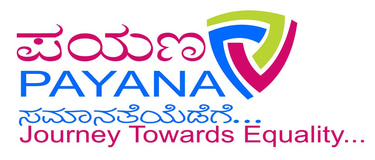Payana Equal Employment
Opportunities (EEO) & Affirmative
Action Policy (AAP)
Introduction:
Payana is committed to fostering a workplace environment that values diversity, equity, and
inclusion. As an NGO dedicated to upholding and advocating for the health and human rights of
sexuality minorities, sex workers, and people living with HIV in India, we recognize the importance of
promoting equal employment opportunities (EEO) and affirmative action to ensure fairness, dignity,
and respect for all individuals.
Preamble:
This policy is established in accordance with the principles outlined in various laws and statutes from
India which prohibit discrimination in employment based on race, color, religion, gender, sexual
orientation, gender identity or expression, national origin, age, disability, marital status, veteran
status, or any other characteristic protected by law. A full list of Indian statutes from which this
Policy draws its salient features is listed towards the end of this document. The law shall have an
over-riding effect on this policy in case there is a contradiction to the interpretation and meaning
ascribed to any of the sections provided for hereunder.
Scope:
This policy applies to all employees, volunteers, interns, contractors, and applicants for employment
at Payana. It encompasses all aspects of employment, including recruitment, hiring, promotion,
compensation, benefits, training, and termination.
Aim/Purpose:
The aim of this policy is to:
- Promote equal employment opportunities for all individuals, regardless of their background or
identity.
- Eliminate discrimination and harassment in the workplace.
- Create a diverse and inclusive work environment where every individual feels valued, respected,
and empowered.
- Implement affirmative action measures to address historical inequities and increase representation
of underrepresented groups within our organization.
Page 2 of 4
What This Policy Seeks to Do:
This policy seeks to:
1. Prohibit discrimination in all aspects of employment, including recruitment, hiring, promotion, and
compensation.
2. Provide reasonable accommodations for individuals with disabilities to ensure equal access to
employment opportunities.
3. Implement affirmative action measures to increase the representation of sexuality minorities, sex
workers, and people living with HIV within our workforce.
4. Educate employees about their rights and responsibilities under this policy and provide training on
diversity, equity, and inclusion.
5. Establish procedures for reporting and addressing violations of this policy, including mechanisms
for investigation and resolution.
6. Regularly review and update this policy to ensure its effectiveness and alignment with applicable
laws and best practices.
Principles Guiding This Policy:
- Equal Opportunity: We are committed to providing equal employment opportunities to all
individuals, without regard to their protected characteristics.
- Non-Discrimination: We prohibit discrimination based on race, color, religion, gender, sexual
orientation, gender identity or expression, national origin, age, disability, marital status, veteran
status, or any other characteristic protected by law.
- Affirmative Action: We recognize the importance of affirmative action in addressing systemic
barriers and promoting diversity and inclusion within our organization.
- Respect and Dignity: We foster a culture of respect and dignity, where every individual is treated
with fairness, kindness, and compassion.
Violations:
Violations of this policy may include, but are not limited to:
- Discriminatory treatment or harassment of employees, volunteers, interns, contractors, or
applicants based on their protected characteristics.
- Failure to provide reasonable accommodations for individuals with disabilities.
- Retaliation against individuals who report violations of this policy or participate in investigations
related to discrimination or harassment.
Page 3 of 4
Punishment and Penalties for Violations:
Employees, volunteers, interns, contractors, or others found to have violated this policy may be
subject to disciplinary action, up to and including termination of employment or contractual
relationship. Payana reserves the right to take appropriate remedial action to address violations and
prevent future occurrences.
Specific Indian Statutes which Contribute to this Policy:
In India, several laws and statutes are in place to prevent discrimination in recruitment and other
aspects of the workplace. Here are some key ones:
1. Constitution of India: The Constitution prohibits discrimination on various grounds including race,
religion, caste, sex, or place of birth. Articles 14, 15, 16, 19, and 21 of the Constitution provide the
fundamental right to equality and prohibit discrimination.
2. The Equal Remuneration Act, 1976: This Act ensures equal pay for equal work for both men and
women. It prohibits discrimination in recruitment, training, promotion, and other employment-
related matters on the basis of gender.
3. The Scheduled Castes and Scheduled Tribes (Prevention of Atrocities) Act, 1989: This Act prohibits
discrimination and atrocities against individuals belonging to Scheduled Castes and Scheduled Tribes
in various spheres of life, including employment.
4. The Sexual Harassment of Women at Workplace (Prevention, Prohibition and Redressal) Act,
2013: This Act aims to prevent and address sexual harassment of women in the workplace. It
requires employers to create a safe working environment and implement mechanisms for redressal
of complaints.
5. The Persons with Disabilities (Equal Opportunities, Protection of Rights and Full Participation) Act,
1995: This Act prohibits discrimination against individuals with disabilities in various areas including
employment. It mandates equal opportunities and reasonable accommodations for persons with
disabilities.
6. The Maternity Benefit Act, 1961: This Act prohibits discrimination against women during
pregnancy and maternity leave. It ensures that women employees are provided with maternity
benefits and protects their employment rights.
7. The HIV & AIDS (Prevention and Control) Act, 2017: This Act prohibits discrimination against
individuals living with HIV/AIDS in various spheres of life, including employment. It protects the
rights of people living with HIV/AIDS and ensures their access to healthcare, education, and
employment without discrimination.
8. The Industrial Employment (Standing Orders) Act, 1946: This Act requires employers to define and
publish standing orders specifying the conditions of employment, including provisions related to
non-discrimination and grievance redressal mechanisms.


